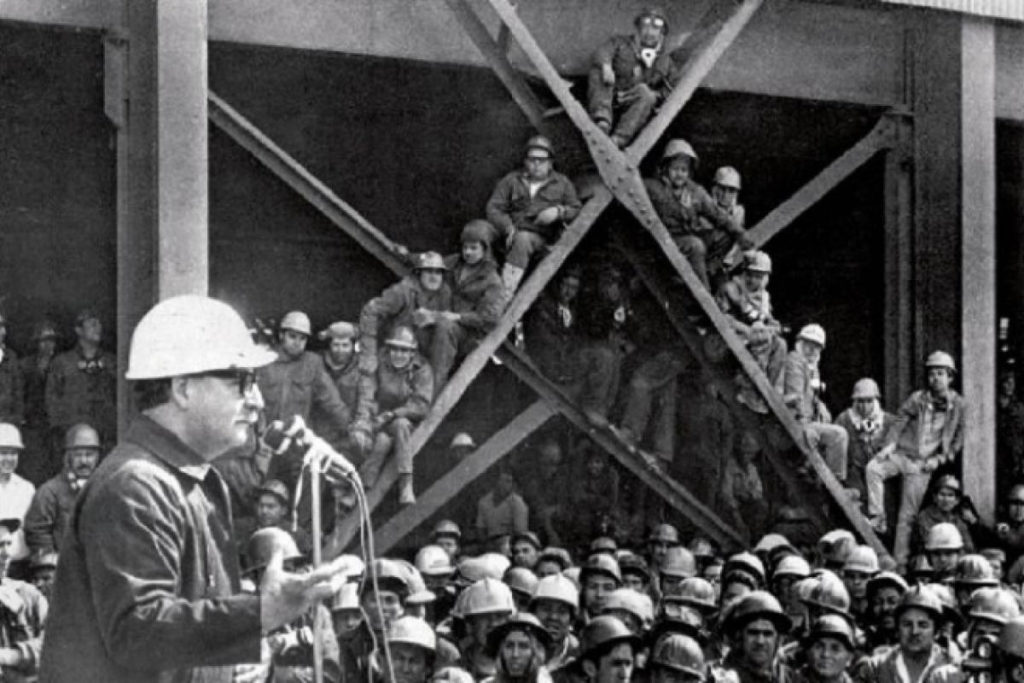The late 1960s were a moment of uprising and struggle, from the French May, to the Mexican student uprising, to Stonewall in the US. In Chile, Salvador Allende was elected to the Presidency with a strategy of the “peaceful road to socialism.” During Allende’s Presidency, extraordinary acts of working class self organization occurred, known as “cordones industriales.” These bodies of working class self organization demanded the expropriation of companies. Augusto Pinochet and the Chilean military began to organize against Allende’s limited expropriations and pro-worker actions. The “cordones industriales” and the broader workers movement demanded arms to defend themselves from the organized right.
Salvador Allende denied them arms. Instead, he made Pinochet the Minister of Defense.
On September 11, 1973, a CIA backed coup was orchestrated by the Chilean military, led by Augusto Pinochet. The genocidal dictatorship brought about the death, imprisonment, and disappearance of thousands of political, trade union and community activists.
But it was not just Pinochet and the army: the coup of ’73 was orchestrated by the United States as part of “Plan Condor,” meant to quell the revolutionary uprisings of the 1970s in Latin America and to subordinate the continent to US imperialism. The US went on to support bloody dictatorships in Argentina, Uruguay and Brazil at the hand of military personnel trained at the School of the Americas for torture and genocide.
47 years after the coup, the pillars of the genocidal dictatorship are still standing. While there are no longer military dictatorships in Latin America, the military leaders who executed the coup were not punished. US imperialism imposed the privatization of education, health, the loss of labor rights, and the strengthening of the police and army to suppress protest. Last year’s uprising in Chile was an uprising against the legacy of Pinochet’s dictatorship.
Here we republish these articles in order to draw lessons from the Chilean revolutionary process, the genocide brought about by US imperialism, and the strategy of reformism that, even with heroic independent actions by the masses, led to a dead end for the Chilean revolution. In the context of a new awakening of the class struggle in Latin America since the rebellion against Piñera in Chile and a historic international crisis, these lessons are of vital importance for revolutionaries.
Chile ’73: Was Victory Possible?
By Dauno Totoro
Allende’s experience was the most radical attempt to achieve socialism through elections and gradual reforms. What went wrong?
September 11 in Chile: How Reformism Disarmed the Working Class in the Face of CIA-Backed Coup
By Nathaniel Flakin
47 years ago today, Chile’s democratic socialist president Salvador Allende was toppled in a bloody coup. A military dictatorship, backed by U.S. imperialism, murdered thousands and introduced a crushing form of neoliberal economics. Allende’s experience shows why reformism is doomed to failure.
Does Lenin Apply Today? Historical Lessons from Chile
By Nathan Moore
The current debate about Karl Kautsky’s legacy is not simply a historical one about Kautsky and Lenin, but an informative discussion among socialists about what we should do today. This first installment will address the historical discussion, particularly the example of Chile.
Letter from the “Cordones Industriales” to President Salvador Allende
By Left Voice
Reproduced here is the historic document sent by the Santiago regional Coordinating Committee of the Cordones Industriales to former Chilean President Salvador Allende. The letter highlights the critical situation these workers found themselves in and the immediate danger of military dictatorship, demands an end to the policy of reconciliation with the reaction and urges the taking of measures to avoid a coup.











